Peak Oil and Community Solutions Conference (Saturday)
Posted by Stuart Staniford on September 27, 2005 - 1:08pm
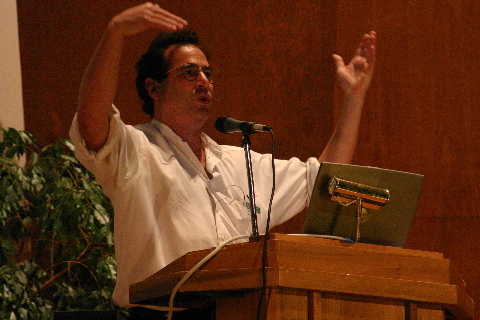
Michael Shuman, author of Going Local, emphasizes a point during his Saturday night keynote address. Report below the fold.
Note that this report was written late Saturday night, and I did not edit the substance in light of the excellent discussion on Friday's report, so one or two points might seem done to death at this stage. I wanted to preserve my reactions as I had them at the time.
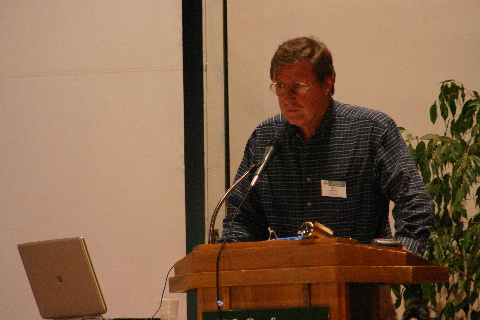
Steve Andrews listens to a question.
First up Saturday morning was Steve Andrews, a longtime green-builder, sustainability expert, and peak-oil worrier. He's a founder of the new ASPO-USA, and is helping to organize their first conference (November 10th-11th in Denver). Andrews is a clear, likeable, and witty speaker, who gave an overview of alternatives to oil. Essentially, it was the conventional peak-oil wisdom; yes alternatives help, but no we can't ramp them up fast enough to make a dramatic difference and we are still going to have to make enormous changes. He sees oil sands and biofuels as the nearest term help, and oil shale only making a very small contribution by 2015.
The most interesting part of his talk to me was a little bit more detailed discussion of Shell's recent in-situ pilot for shale oil (he lives in Colorado and has talked to the Shell folks). According to Andrews, the method involves drilling wells 30 feet on center (!) through 1000 feet of overburden into 1000 feet of payzone shale. They'll be heating the wells in the middle of some largish area, but creating a freezewall around the edge (using liquid ammonia piped down a wall of wells). The latter is to prevent ground water infiltration which would both ruin their energetics (because they'd be heating up groundwater which would then leach away heat), and also cause contamination. Shell is apparently expecting to take six years to get permitted for a larger project, and then another six years to carry it out. Definitely the fuel of the future.
John Ikerd in full pulpit-pounding mode.
Next came John Ikerd. Ikerd is a retired agricultural economist. The first half of his career he was a mainstream professional doing projections of hog prices etc. In the second half, he began to get the sustainability bug and he's increasingly worked on sustainable agriculture since. He's from Southern Missouri, and gave a tent-revival, rabble-rousing speech, interrupted by frequent bursts of applause and followed by a wild, clapping, cheering, foot-stomping standing ovation. It wasn't your typical economics presentation.
His speech bugged me, but obviously I was not a typical member of the audience and you should find a way to see him for yourself and make your own mind up. Based solely on audience reaction, he's definitely the strongest contender for man-of-the-conference so far.
Ikerd's thesis in a nutshell is that the industrial revolution was a mistake, and we need to go back to where we went off course and start over. Our culture is focussed entirely on short-term greed and profit. We use up non-renewable resources as fast as possible, and degrade renewable resources as fast as possible, with no thought for the welfare of our descendants. If we always evaluate projects by their return on investment (ROI), then we inevitably will take decisions that are much better for us than our descendants. Not only that, our own sense of community and human relationships is degraded by all the competition and materialism, and really we would be happier if we didn't have all this stuff that we appear to want when offered it. Neoclassical economics is in a state of sin for justifying and apologizing for all this: the early economists, Adam Smith and David Ricardo, were very conscious of the limitations of economics and the importance of values other than just material ones. But the neo-classical economists lost this perspective and have elevated greed and materialism to a central place in the discipline and in the larger culture. Instead of all this, we need to build a culture that is sustainable - where we respect the planet and its resources as sacred and all decision-making is focussed on ensuring that we are doing things that will last for the long haul.
Furthermore, we should, as a response to peak oil, find a way to quickly stop using all fossil fuels and other non-renewable fuels such as nuclear, and get back to an entirely biomass+renewables economy.
In a way, his speech was very helpful to me as he crystallized and personified a particular strand of the peak-oil movement that I cannot get behind (at least not at present). The problem I have is this. Firstly, while I agree with some of his critique of the lack of sustainability of industrial civilization, I think it's important not to throw the baby out with the bathwater. Many of the most incredible intellectual achievements of the human race have been critically enabled by the industrial revolution. Whether it's going to the moon, developing the theory of quantum mechanics, building computers, etc, etc -- everyone will have their favorite list -- these are profound achievements and we would be less as a species had we stayed a society of mostly peasant farmers and not done these things.
Not only that, even if we grant Ikerd that the industrial revolution was a mistake, we did it and we are stuck with the consequences. We are not now in the situation we were in back in the seventeenth century. Most relevantly, there will very soon be ten times as many of us. Life was not comfortable and ample in the seventeenth century. It was cramped and societies (at least in Europe and Asia) were running out of all kinds of natural resources - there were famines, and a number of countries were increasingly short of timber (which is why they resorted to coal shortly after).
So if we go back to a seventeenth century level of energy use, it's very unclear, at least to me, that we can feed anything like the current level of human population. I think somebody, especially an agricultural economist, advocating that course of action has a responsibility to have some scheme for how that is possible. I got the chance to ask Ikerd the question and it was abundantly clear that he hasn't thought carefully about it - indeed he suggested that it would be impossible to really project. It sounds wonderful to spout general principles of sustainability, but if the hidden subtext of what one is advocating is a 90% die-off, how morally uplifting is that? I want people who are advocating a return to seventeenth century levels of energy use to put together quantitative studies of amounts of arable land, crop yields etc, that give some reasonable confidence that this would work. What do we know now, that our ancestors didn't know 250 years ago, that will allow the same amount of land to support ten times as many people with no more energy input?
Now, if post-peak depletion rates are high enough, maybe it will all turn out to be hopeless anyway. But I think we should make a damn good attempt before we just assume that.
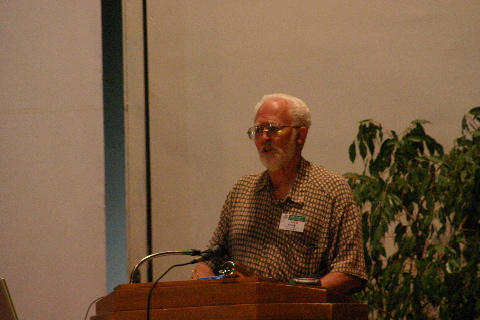
Pat Murphy responds to a question.
Next up was Pat Murphy, the executive director of Community Solutions (the conference hosts) who gave a presentation on "Armageddon or Eden?". He gave a left-leaning review of the history of European colonialism, and subsequent more subtle domination of the planet by American and European interests, covered the various nationalist and revolutionary responses to that, and suggested that one possible outcome of the peak oil situation was nuclear conflict between the US and China, Islamic countries, or others. Alternatively, he argued that humanity has the option to powerdown gracefully into a sustainable world where we'll all be much happier.
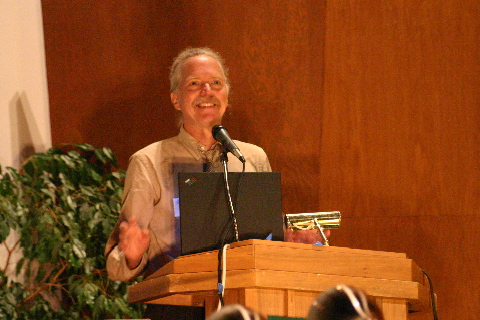
Jan Lundberg looking much too happy for a man who believes civilization is about to collapse.
Following Pat was Jan Lundberg, of Alliance for a Paving Moratorium fame. Jan holds an extreme peak-oil position which he refers to as petro-collapse. The idea as he espoused it today is that, the first time there is a significant oil-shock post peak, people will begin to fill their normally half-full tanks and otherwise hoard gas. This will cause widespread unavailability of fuel and lead to failure of food deliveries, panic, loss of law-and-order, and immediate total collapse of civilization. As he put it "the next oil shock will be the last".
This early stages of this thesis have some support - for example the British experience of 2000, and problems with hoarding in the 70s oil shocks. However, society managed to cope with those experiences despite some unpleasantness, and I see nothing about peak oil that would fundamentally change that.
Much more interesting was a short documentary he spent part of his time showing on the effects of plastic in the oceans. Plastics break down into particles of all size, but never degrade away altogether as the molecules are too large and unfamiliar for any bacteria. It is alleged that all the plastic ever produced is still around on the planet somewhere. The researcher in the documentary was studying the ratio of plastic particles to krill in the open ocean (specifically an area called the Pacific Gyre). There is six times as much plastic as krill by weight, and the amount of plastic is up about 300% since 1990. Now, the open ocean is notoriously a biological desert as there are hardly any nutrients. However, I still found these numbers staggering...
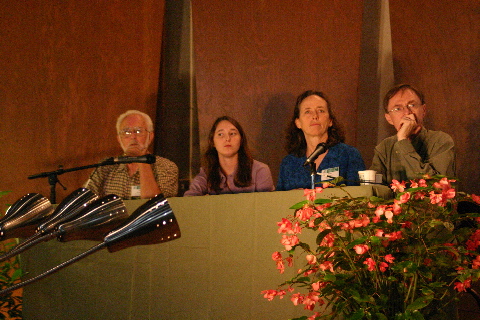
Cuba discussion panel. Left to Right: Pat Murphy, Megan Quinn, Faith Morgan, and Richard Heinberg.
Next came a video put together (but not quite finished) by Faith Morgan on the results of two trips to Cuba to explore the experience following that country's 50% oil shock after the collapse of the Soviet Union. Many people think this is an interesting laboratory for peak oil - what happens to a somewhat developed industrial-agricultural economy following major oil supply loss. The story in the video, which is fairly compelling, is that the Cubans suffered massive hardship, but came through it. They made a top down decision to completely switch from a Soviet-style collectivized industrial agriculture to small-scale organic production (in many cases giving farmers long-term individualized land tenure for the first time), and made widespread use of urban gardens. They imported millions of bikes from China, and used extensive bus runs to get people around. During the "special period", they lost 30lb on average! But very few people died and the regime survived. Their diet has improved enormously as they eat much more fresh produce now. The experience contrasts sharply with that of North Korea which faced a similar problem, didn't adapt, and ended up with massive starvation.
One of the points that was particularly interesting in the video is that it seems the Cubans had written contingency plans for major oil supply loss, in case of a US blockade of the island. One of the speakers asserted that this was critical to their success - they only had time to carry out one plan, and if they'd been making it up as they went, they probably wouldn't have made it.
It's a cool video, and presents a very positive image of Cuba which I was a little suspicious of - it is, after all, a dictatorship with a bunch of its dissidents in jail for criticising the regime. I like this more cynical Harper's piece. However, the enthusiasm of the various Cuban speakers for their country and what they had achieved despite bloody-minded US obstructionism was obviously genuine and heartfelt, so there must be some good things about the place (at an absolute minimum, they are vastly better at evacuating their citizens out of the path of hurricanes than the US is)
The panel led a fascinating discussion of the extent to which the Cuban experience would be, or could be, replicated in the US if we faced a similar situation, and whether the US post peak would be similar.
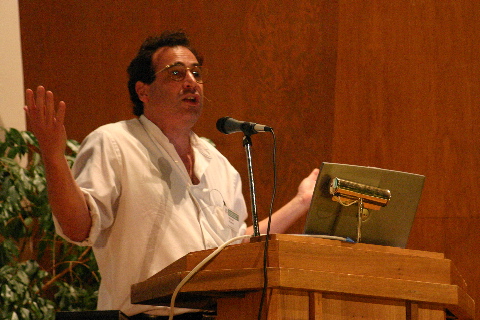
Michael Shuman in action again.
Finally, we have Michael Shuman, author of Going Local. Shuman is an economic development expert who advises his local government clients how to improve their economies. He's a wonderfully polished speaker, and one of those expressive New Yorkers who talks with their hands. I spent too much time trying to photograph him in full flow of wonderful gesture (in a low-lit room, with ceiling too high for my bounce flash, with resulting long exposures), and not enough time listening to him. But the gist of his argument is that in a post-peak world, economics will get more local of necessity. This is a good thing in his view as local economies are more robust - it's very dangerous to have your economy dependent on one or two big exporting corporations which can always pull up stakes and leave you in the lurch.
He articulated at length how it is much more cost effective to pursue economic development by promoting small local businesses that will substitute for imports to the local economy, rather than trying to woo large outside businesses that will become exporters from the local economy. The main reason is that those big export businesses have become incredibly good at playing communities off against each other and drive outrageously hard bargains. I was persuaded by his case, and here's another picture for good measure.
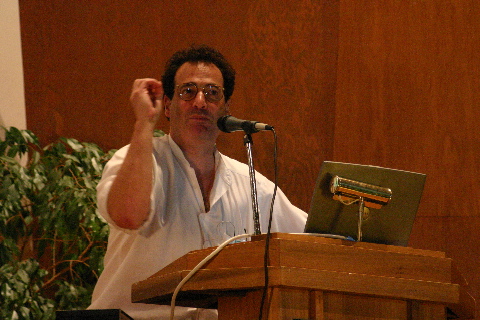
After that, we went to the party where we had pie from a local baker and an impromptu band of Jan Lundberg, Richard Heinberg, and an economist lady (who's name I didn't catch) played music. But your trusty correspondent considered himself off-duty and didn't take his camera, so you'll just have to imagine it.




I was at the conference and don't think Steve Andrews was as bullish about shale oil as you imply. His point about the pilot was that the EROEI was pretty low as they would be heating it with electricity, and it required a LOT of water. He reminded us of the quote "Shale oil is the energy of the future, and it always will be"
We plateau'd his "beyond 2040" out almost 100 years 'til the USGS URR was exhausted. His is a "work-in-progress" and our collaboration has initiated his being more committed now to a 2.5-Tb URR having seen the visual consequences. This is the intention of our studies... to bring all the models closer together based on constructive criticism and collaboration. We found that even Colin Campbell, given time (about a year), eventually agreed that the arithmetic errors we pointed out were in fact in order and thus led to a less ambiguous and contradictory table.
TheOilDrum has likewise done its part in exposing gross errors by participants on both sides of the issue.
And so today we première the Total projection scenario. Total is the fifth largest of the oil firms in terms of exploration and production. Its forecast methodology, like that of BP, uses a definition of URR that includes "only confirmed findings"; thereby does not include "undiscovered reserves or some unconventional oil types". This limitation precludes our ability to illustrate Total's peak extraction of 110-mbd in 2023 that the firm alludes to in some of its press releases. We arbitrarily limit the models to show only production levels that are supported by the forecaster's volume within its chosen URR. When & if Total feels more confident in using non-conventional and undiscovered oil projections in its URR calculations, we shall undertake to draw the respective production that would then be validated. Our new graph is at http://TrendLines.ca/economic.htm
The presentation on Cuba illustrates just that - a totalitarian government is praised for "successfully" coping with oil supply reductions by only having its population lose an average 30 pounds of body weight - all so that they would not be allowed to join the world's free market in energy.
Another presenter preaches sustainability but leaves unanswered the consequence that 70 to 90% of the world's population would starve to death if the policies he advocated were adopted. And the audience cheers, claps, and stomps their feet in encouragement.
Doesn't this sound a bit like Pol Pot talking to the Khmer Rouge?
While I'm on board with the geological prospects of Peak Oil, I vigorously disassociate myself from those advocating mass starvation and totalitarianism. You hang with those people and NOBODY responsible will pay any attention to you. Some of these people are giving Peak Oil a very bad name. Once you lose your reputation, you'll never get anything constructive done.
I don't think any of the speakers are advocating mass starvation. It's my inference that that is a likely outcome of trying to go back to a pre-industrial society - an inference that's worth debating I think (as we did, vigorously, yesterday). There certainly are people in the peak oil movement who think mass starvation is inevitable.
As to Cuba: I was uncomfortable with what I thought was an unbalanced presentation that made no mention of political repression there. At the same time, I think it's extremely questionable that the US could survive a near overnight 50% loss of oil supply and have it be no worse than a weight loss program. I think that really is an achievement and it's well worth studying how they did it. Just because we disagree with a country's political system is no reason not to study them and steal their best ideas. I deplore the current US policy on Cuba and think it only serves to prop up the regime there.
I think there is a huge risk of peak oil triggering a descent into authoritarianism (either of the left wing or right wing variety). I think that's devoutly to be avoided. I also think it's very likely that we'll see greater government involvement in the economy (because it will be politically infeasible for them to let the market run its course - just as major wars tend to trigger rationing etc, I think there's a strong likelihood that peak oil will too.
My own desire is to look at all pieces of evidence, and listen to all points of view, and know something of all relevant academic disciplines, and do my best to understand and synthesize them as objectively as I can, without fear of whether my conclusions make me temporarily popular or unpopular with particular segments of opinion.
Finally, I wanted to say that I appreciate your perspective and encourage you to keep voicing it. I sense that many ODers are a little more left-leaning than you are, and I hope you'll not be deterred by that but continue to give us your thoughts.
The German Wehrmacht (Army) of 1941 was probably the most superb instrument of military aggression ever invented. There was literally no one on the planet who could beat it.
However as conditions changed (one of them being a growing shortage of... oil and petroleum products) and new competitors emerged, the Wehrmacht was eventually defeated and obliterated.
Ecological niches change due to outside forces. Some societies (states, civilisations, organisations, institutions) can, and do, adapt rapidly enough. Some do not.
The Roman Catholic church has adapted rapidly enough to changed circumstances to survive for 1500 years with over 1 billion adherents. The Manichean church, or the Nestorian one, by contrast, are extinct enough that most people will have to look them up.
the point about Cuba is this. In a world of relative abundance of energy and raw materials, a free market, decentralised authority state like the United States is best poised to seize opportunities.
In an environment of sudden and rapid energy scarcity, then a society with greater discipline (and discipline usually means secret police, prisons etc: in the post 9-11 world, Mr. Bush has said as much about the US) may be able to adapt more rapidly.
Not always. North Korea clearly did not (or did so at huge human cost to its people). But Cuba has, and did.
It's not an ideal state (losing 30lbs each) and McKibben is the first to point that out. But survive they did.
One can imagine in a parallel situation the US falling into complete civil disorder. There are over 150 million guns out there, and populations that are locked into needing cars, factory-style food production etc. It's not a recipe for a happy collective sitting down and rationing.
If there was such a breakdown of civil order, I would imagine that it would be followed by the emergence of 'militia states' a la the southern US during the Reconstruction Era, that would impose order (at the cost of the loss of some personal freedoms).
The open water between Castroist Cuba (a totalitarian state) and a USA which is rather more militaristic than now, would be smaller than it is today.
I feel, as a moderate, that all those tools are good and have applications. I'm nonetheless continually saddened by the knee-jerk responses. Folks who think they have the tool will be the first people to jump on a problem, and folks who don't have the tool will be the last.
This makes for a lopsided response at best, and "political holdouts" at worst, who will deny a problem with their last breath.
Just hope peak oil doesn't follow the global warming pattern too far.
Cuba couldn't join if they wanted to, there's an embargo by the US, that virtually no other country in the UN supports.
And to say that a modestly complimentary video about Cuba is akin to Pol Pot might well be seen by many as harboring an extreme right wing agenda - and if we get too much of that it could give Peak Oil a very bad name!
The US embargo does not deny Cubans access to free market energy - their own government does.
Pol Pot was a Communist as is Fidel Castro. Both have ruined the countries they rule or ruled. How is pointing out the self-avowed similarities an extreme right wing marker?
The presenter on sustainable agriculture would argue (if he dared) that the elimination of billions of people would be a "natural" and logical consequence of the policies he sees as necessary. The only way to get to the future he postulates and advocates is mass death. Pol Pot caused the death of millions of his subjects in the name of his ideology too. Granted, Pol Pot was worst but then, none of the presenters have gotten absolute control of a country yet!
I'm criticizing proposals, analysis, and methods that are founded on a strain of political thought that has caused the misery and death of millions of people over the last 100 years - Radical Leftism.
While trying to fathom people's motivations is always risky, I also think that radical leftists are attracted to Peak Oil issues BECAUSE the topic offers the prospect of radical transformation of industrial civilization and would weaken the existing democratic paradigm. One can see this is in the anti-Americanism in Campbell and others, a topic with little to do with the geology and technology of oil extraction. Admit it, doesn't the heart quicken at the thought of being in the Vanguard of Sustainability?
As to Stuart's point about we all have to live together, I'd have to remind people that even Stalin had to give Trotsky the ax for being too radical.
I'm listening too but what I'm hearing is too often not constructive and is too often against the peace, freedom, and tranquility of the great mass of people. And guess what? People are going to catch on and any discussion of "peak oil" will be labeled a subject for cranks and discontents only.
As to me being a Republican - yep. Straight ticket, Rocked Ribbed, and (if those new nukes get ordered), maybe someday a Country Club Republican. Higher gasoline taxes, excess profits taxes, and price controls are all too liberal for me. I will say that the re-regulation of electric utilities is a sensible idea so you can call me a Progressive Republican.
I do feel that peak oil is going to pose some challenges for Republicans. Carter was the first peak-oil president. Your leaders, from Reagan through Bush II, have been extremely clear that it was "Morning in America" and that any effort to conserve energy, or even research conserving energy, was a bad idea. I think that's going to be very politically damaging and hard to shake off, if indeed the near-term peak hypothesis is correct. I also think the interaction of net-present-value calculations with both renewable and non-renewable resources is going to look, well, imprudent, as we get into a post peak world. So I think free-market economics might take a big ideological hit, in the same way that the collapse of the Soviet Union just about finished off Marxism as a credible ideology.
However, all that makes me extremely appreciative of those of you Republicans who are more interested in the truth about peak oil than defending your ideological position. In general, I prefer competence and pragmatism over ideological correctness (eg I would vote for a Schwarzenegger/Giuliani type Republican sooner than a Ralph Nader type leftist and I'm with Dave in his call for a 2008 Roscoe Bartlett presidential campaign).
I am handicapped by not being in attendence but I didn't mean to imply that some presenter is ADVOCATING the immediate death of billions. I'm also sympathetic to a vision of our planet with only 1 billion rather than 8 or 10 billion - but only as a fantasy. To present and advocate policies that condone and facilitate such a policy of involuntary population reduction is morally analogous to building the mythical Doomsday Machine back in the Cold War days and just as repugnant. Both are bad ideas and pointless.
The only morally worthy activity is to engage in physical and mental work to keep the current world population fed, healthy, educated, and prosperous. Zero population growth is an excellent, useful position but willful, involuntary NEGATIVE population change is unethical.
As to Cuba, how an imploding, isolated, comand and control economy can offer meaningful "lessons" to a giant, global, vibrant free market is difficult for me to envision. Also, I don't think that anyone has proposed an overnight 50% reduction in oil supply as a plausible scenario for the US economy.
Remember that Beatles lyric:
"You go talking about Chairman Mao, ain't nobody gonna listen anyhow..."
To reiterate my political point - the Peak Oil community needs to understand the moral and ethical implications of their advocacy. Your efforts will be endorsed by the wider community only as to how it is judged to support the welfare of people. Holding up an enslaved society like Cuba as an exemplar or prescribing the death of 80% of the world's population will get you turned off and ignored.
Secondly, no, we are not going to lose 50% of our oil in one year. But "a giant, global, vibrant free market" is in a way far more sensitive to smaller declines in oil supplies than was Cuba. Once we are on the backside of the oil curve, we could see declines over 5% or more a year. If this were the case, without adequate preparation, the results could be very serious.
two points:
- the point about Cuba is that a command economy might be more capable of making a rapid adjustment to a change in its circumstances, than a more free market economy.
There is precedent. By any measure, the most successful economies in WWII at mobilising resources for war were the British and the Russian. The latter was already a completely socialist state, and the former adopted total market socialism (rationing, the works) for the period of WWII-- so successful was Britain, that despite having a pre war economy only half the size of the Nazi one, and despite the brutal disruptions of the submarine war, in 1941 they managed to outproduce the Nazi economy in terms of total war production. It was a stupendous feat, and, indeed, another part of Britain's 'finest hour'. (see Alan Milward, The World Economies 1939-45. Penguin Books).
- 50% drop in oil supplies is dramatic. But it's not impossible. It would take a serious blowup in the Middle East, but the world is on a very fragile supply line from Middle Eastern oil. If someone found a way to close the mouth of the Gulf, and/or there was a revolution in Saudi Arabia, we would be well on the way to a 50% cut in supply.
Cuba made a dramatic shift. If one believes the Peak Oil thesis, the whole western world will have to make that shift, albeit over a longer time period.
Such a time period may give time for the marketplace to work its magic, create new technologies and new sources of energy. But we can't double the fuel efficiency of the US car fleet overnight for example.
Welcome to the Oil Drum.
The Republican Party has been hijacked by some truly scary groups of people. Whether it is the 'tax cuts, above all' crowd, regardless of the Federal Budgetary position, or the 'the Gospel of Revelations determines our Middle Eastern policy' or 'there is no global warming', the modern Republican party has been hijacked by the radical fringe.
The point about Cuba was what does a society do when it is forced to alter its position radically in a very short time period?
Whatever we might think of Cuba (a fairly unpleasant totalitarian state) the fact that they adapted so quickly and successfully is a tribute to their people and their system. Cuba is not wholly responsible for its current position (the US embargo is mean and irrational) but it is substantially so.
The open question, in light of some of the events of the 1970s in the US, or the petrol strike in the UK in 2000, is whether our societies could adapt as quickly to changed circumstances.
My own view is the global CO2 problem will be the acid test. If we don't tackle it, with substantive measures, and soon, we won't have any options left by mid century.
We had plans for Katrina as well. But then, we also had FEMA.
Firstly, I would like to thank everyone involved in setting up and participating in this site. I have been visiting regularly since the site started and have always found the posts and following comments very informative and revealing. Recently, I have followed the hurricane resource pages avidly. Congratulations on a fantastic resource and community.
Here in New Zealand, like everywhere in the world, there is a growing unease about the results of our dependence on many non-renewable resources, and the difficulties of mitigating the effects of any decline in supply or availability. Peak oil is a concept that many people here are aware of and very concerned about. In the recent election the green party made peak oil a major part of their policy, and it looks very likely that they will be a part of our new government.
For myself, as part of my preparations I have been mindful that as the effects of peak oil flow through our society (pun intended) those societies or individuals that have been prepared will survive much better. I am also very aware that if it is not me facing the end of oil it will certainly be my children. To that end, I have left my job in advertising, ironically the last commercial I worked on was for an American SUV! and now work as an Energy efficiency advisor in my city helping households and businesses reduce their energy demand and requirements. I am also trying to reduce my own dependence on non-renewable resources through a number of simple and practical solutions all of which have been well covered in the discussions on this site.
Which brings me to my post. I would like to offer the observation that just as we slowly and inexorably got ourselves into this mess, the best solution will probably be a gradual and incremental change towards a more sustainable way of life. If we all start to introduce small changes in the way we live, and carefully build on them, in time we will have achieved a significant change. It's as simple as if everyone driving vehicles simply tried to drive less, tried to combine trips and even better tried to combine trips with another person. The simple fixes are often the easiest and in the long run the best. If we look for immediate and more problematically, technological solutions, we will only walk into what Ronald Wright so brilliantly described as a progress trap. As has been pointed out many times on this site, millions of people live on this planet without substantial use of fossil fuel already, and strangely they will probably be the ones affected less by any disruption in it's supply. They already grow their own food and shelter and do not rely on a complex petrochemical fuelled supply chain to obtain it.
Reading the commentary on the community solutions conference is uplifting and reassuring. Understanding the problem and debating its solutions are very important. I know that very existence of this site shows a lot of people are doing some amazing work already raising awareness, and I hope that in time this will result in a positive and sustainable change.
Ben.
http://quote.bloomberg.com/apps/news?pid=10000006&sid=afVg.BEwF2Jw&refer=home
via Washington Monthly...
-------------------
Sorry, but I just can't take this kind of news seriously, at least not without a LOT of solid and independently verified evidence. It bugs me to no end that many people who should know better will naively accept SA's claims, even while Simmons and others are screaming for proof.
welovethesaudioilminister.com.
There ARE better ways --without fuels-- to farm than Europeans/Americans knew in the 1600's etc. Permaculture is one of these ways. . . Most Americans, at least, are so urbanized that labor-intensive farming is not going to be something most of us know how to do, even if we have the land to do it on.
Regarding Jan Lundberg's talk, it seems to me that there IS a major difference between the oil shocks of the 70's and the post-peak oil scenario. The 70's oil shocks were temporary; the post-peak oil shock will be permanent. This, I would think, is bound both to sustain and to increase hoarding behavior (as long as hoarding is still possible).
But what of all the other natural resources? They have a "hubbert peak" as well!! Seven billion folks will be using up the copper, gold, aluminum, bauxite, iron, diamonds, etc etc etc. China and India are developing a middle class and avg annual earning are rising for those on the bottom. They are becoming consumers and even if the rate is not impressive, the absolute numbers are staggering.
Yet, there is little in the way of depletion analyis. I don't want to see a ton of new websites ... peak copper, peak iron, peak sulpher, etc; but it is clear that each resource is running down and that will eventually cause change in our lifestyles. New technologies and replacement ingredients will mitigate some of what we take for granted, but each mineral is going to surprise us someday with the revelation that we have been taking reserves for granted...
In short, how long can Earth support 7 billion souls based on all consumer goods and their inherent components? And then add to that the Energy use. Oil is but one factor. In that light, the dieoff camp is on to something, they were just a tad single-issue minded. The picture looks much worse and we all know that there really is no such thing as sustainable growth when it comes to finite resources.
If Earthlings do not come to terms with population control, there is a mess ahead. There is likely not enuf for 7 billion to go on for a hundred years. When discussion comes up wrt Earth being able to support 1 Billion, there seems merit to me as distasteful as that topic may be.
I do know the feeling. Thank you, Stuart, you made my day.
If you permit me some personal nostalgia: This all reminds me of a conference I attended back in 1978-- it was called the World Game, and held in Amherst, Mass. Speakers included Denis Hayes, Hazel Henderson, and Amory Lovins -- big hitters of the sustainability movement then and now. A bunch of us young energy enthusiasts were hoping that maybe, just maybe, the world would change before something drastic happened, even though Carter's energy bill had just been defeated. Some of us attendees had professional backgrounds and there were leftover flower children too. Amidst the serious analysis people screamed about the dangers of nuclear energy and genetic engineering, and others talked about leaving New York to do organic, sustainable farming in Vermont. Sometimes you wonder if anything ever changes.
Lou's comments about the Matt-mobile were spot-on and hysterically funny.
http://www.energybulletin.net/1512.html
http://www.energybulletin.net/1516.html
TLtG is so derided, that most people no longer remember what it said. Simmons goes back and rereads it, and finds its projections for the world of 2000 surprisingly close to the mark.
The one area where I think LTG got it a bit wrong (a bit) is that population growth rates have fallen much faster than anyone believed at the time. Partly due to the one child policy in China, and a surprising drop in TFR (total fertility ratio ie children per woman over her lifetime) in developed countries (noticeably Russia, but also all of Europe and Japan).
Simmons basic conclusion is we have wasted 30 years, when we might have been preparing for what awaits us.
I found this interesting coming from a Texan oilman, albeit a heterodox one.
The birth rate is anomalously low by European standards. The mortality rate (especially for men) is anomalously high-- Russian men live 13 years less on average than Russian women.
This isn't the biggest effect, IMNSHO.
http://www.mindfully.org/Plastic/Algalita-Ocean-Plastic22oct02.htm
Plastic particles become toxic because they have been proven to attract and absorb elements like DDT and PCB up to one million times normal ocean background levels. Plastic particles become floating poison pills that can resemble food.
So the plastic absorbs the PCBs and re-distribute the PCB and other chemicals to the sea-life.
The most useful part of Ikerd's talk, since we already understand the unsustainable diagnosis, is his remedies. IKDERD DEMOLISHES THE IDEA OF INTERNALIZING SOCIAL COSTS AND OTHER EXTERNALITIES. After a career in accounting I have been telling people we should try to get externalities on the ledger, and find and pay those people harmed by firms' activities, and then the economy would operate more sanely, more justly. IT would produce its outputs more efficiently since it would be measuring its full costs, and it would distribute them more equitably.
Ikerd's position is that social trust and bonds, and moral and ethical considerations such as the environment, are so fundamentally different from economic costs that it will be wrong to put them on the ledger, and let whoever has the most money control them. All these proposals for cap and trade, pollution taxes, or any enclosures of commons or privatization of public goods are wrong, he says.
I'm still trying to figure out then, what his ultimate prescription is.. The constitutional amendment granting rights and equality to future generations, for example. Yeah but you still need an implemnetaion, an interpretation. I think we can agree, in principle that pollution can be simply banned instead of marketized. But I still don't see any remedy for the runaway, cancerous growth of the "neoclassical industrialization" that Ikerd described repeatedly. I agree with the diagnosis but I simply think the billionnaire class will keep supporting the mass murderers like Bush Cheney and their endless wars. I see nobody trying to stop neoclassical capitalism. It will continue to run its course, destroying the planet, until one day, one of the weapons labs will release a smallpox or something that wipes out 99% of the population (the billionnaires will immunize themselves.)
Todd Boyle (425) 827-3107
9745 128th Avenue NE, Kirkland WA 98033-5286
http://www.ledgerism.net/ member of this and that
http://vfp92.org http://epjc.net http://watir.org eastside media action